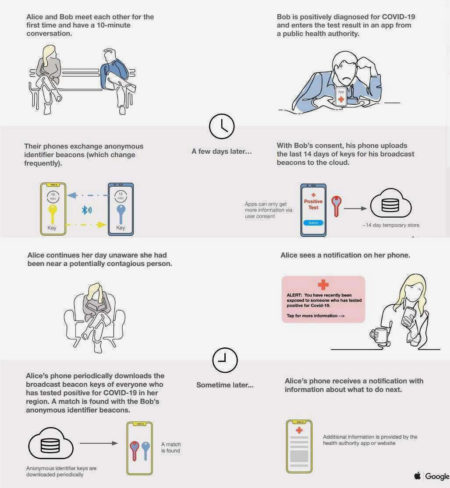Key insights:
Last week, Apple and Google set aside their decade-long rivalry to unveil a contact-tracing initiative using Bluetooth technology on both of their devices to help combat the spread of COVID-19.
In May, the tech giants will release an API to enable interoperability between Android and iOS operating systems, meaning third-party apps (such as those from public health authorities) can perform contact tracing among users who have opted-in with symptoms of COVID-19.
In their respective announcements, both Apple and Google were at pains to emphasize the spirit of collaboration, not to mention their enthusiasm for helping governments and health agencies to save lives. The initiative is indeed a noble effort by the tech giants to play their part as civic leaders—but so would paying your full share of taxes that help fund public health (but that’s another matter).
Reading between the lines, it’s clear that lessons can be learned when two competitors lock arms—lessons (particularly for Google’s ad sales business) that can be applied once whatever passes for “normality” resumes post-crisis.
Looking at this initiative through a marketing lens, we can see it employs identity, measurement and attribution in order to drive a desired outcome—the core value proposition of digital advertising. Given that about 85% of the revenue for Google’s parent company Alphabet comes from ad sales, and Apple appears poised to make a fresh charge in a similar pursuit, their commercial teams are likely watching with interest. Especially as the entire sector searches for a new means of operation now that third-party cookies are coming to an end—the original interoperable tool used by the online ad industry.
Anonymous beacons
Of particular interest is the “anonymous identifier beacons” (see stages 3, 4 and 7 of the infographic) that are exchanged, temporarily stored and then matched at the appropriate moment. This is much the same way that the online ad industry has been using cookies to match the right ad, to the right user, at the right time for years, and the core of Google’s success.
Just how much crossover there will be between the respective commercial and contact tracing teams at both Apple and Google (as they seek privacy-friendly solutions for a post-cookie world) remains to be seen, but experts noted the potential synergies.
Robert Webster, co-founder of marketing consultancy Canton Marketing Solutions, told Adweek the initiative demonstrated how opt-in identifiers can be used without jeopardizing user privacy.
“The advertising industry could learn from this, where people opt into an ID and a level of anonymous tracking to help the community’s public health,” Webster added. “The principles of privacy and tracking we may see replicated with the cookie replacement, where the data shared is heavily limited.”
Additionally, the fact that these identifiers work across Android and iOS is of interest, Webster noted, particularly as both Apple and Google have implemented restrictions on how third parties can access their mobile operating systems in the name of privacy.
Single-use identities
Ana Milicevic, co-founder and principal at consulting firm Sparrow Advisers, observed how the outlined “temporary anonymous identifiers” may point to how the online media industry can carry out transactions without a third-party cookie infrastructure.
“It’s interesting that you could have single-use identifiers [that are accessible by third parties and then deleted after a period of time], and then the more persistent identifiers are owned by Apple or Google,” she said.
Milicevic did point out that privacy concerns will have to be addressed if this is the way forward for the online ad industry. For instance, telcos and offline data onboarding companies have had this capability for years, but many have declined the opportunity to fully monetize it for fear of sparking a huge public backlash.
Deterministic value
Meanwhile, Matt Prohaska, CEO of Prohaska Consulting, noted how the current health crisis is helping bridge the historic philosophical gap over user data between Apple and Google, and that it may point to a compromise solution over privacy.
https://www.adweek.com/programmatic/the-business-case-for-apple-and-googles-social-altruism/


